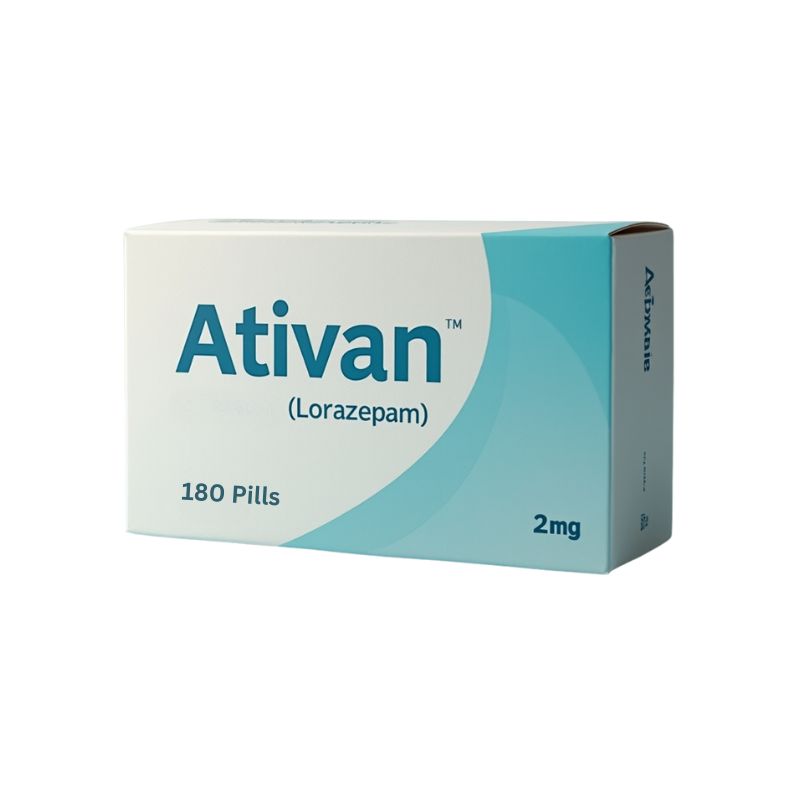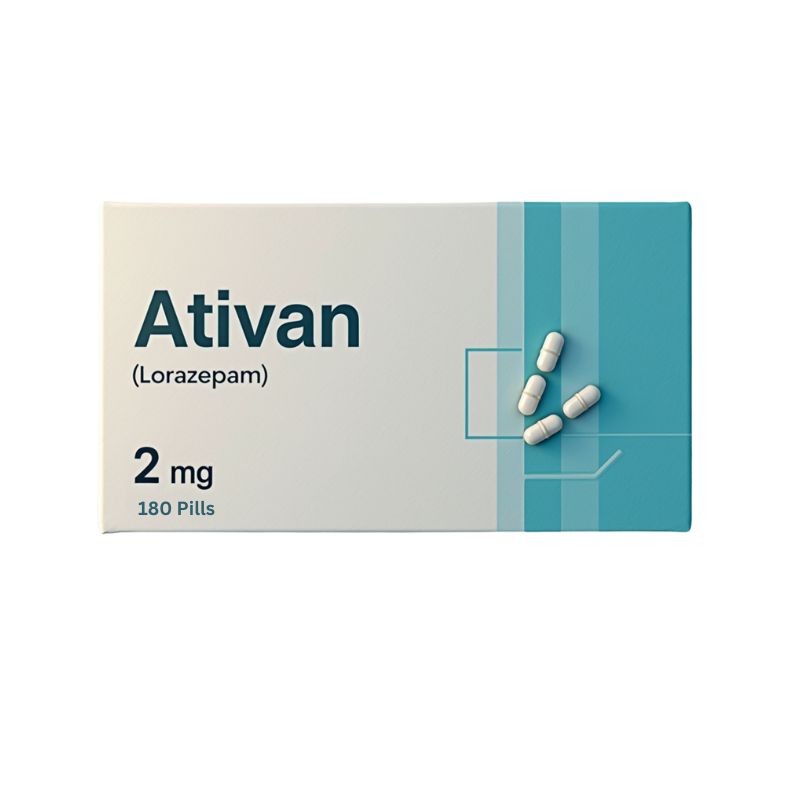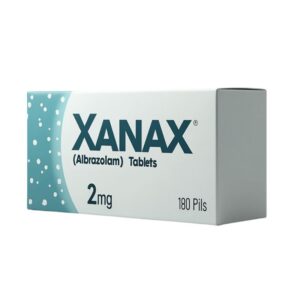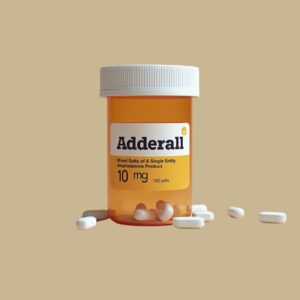Ativan (Lorazepam)
Brand Name: Ativan
Generic Name: Lorazepam
Drug Class: Benzodiazepines
Available Strengths: 0.5 mg, 1 mg, 2 mg
Forms: Oral tablet, oral solution, injection
Controlled Substance Schedule: Schedule IV (U.S.)
FDA Approved: Yes
Common Uses: Anxiety disorders, insomnia, seizures, procedural sedation
What Is Ativan?
Lorazepam, which is sold under the brand name Ativan, is a benzodiazepine drug that is used to treat anxiety disorders, panic attacks, insomnia, and seizure disorders and to make people sleepy before medical procedures. As a central nervous system (CNS) depressant, Ativan makes a neurotransmitter in the brain called gamma-aminobutyric acid (GABA) work better at calming down. This makes you feel less anxious and more relaxed. Ativan is often chosen to treat anxiety or agitation right away because it starts working quickly and has a short to medium half-life. It can be taken by mouth or injected, which makes it useful in various clinical situations.
How Ativan Works
The benzodiazepine receptors that are part of the GABA-A receptor complex are what Ativan works on. When GABA binds to its receptor, it slows down neural activity. It is the brain’s main inhibitory neurotransmitter. Lorazepam boosts the effects of GABA by increasing the number of times channels open. This causes:
- Medications for sleep
- Anxiolysis (effect on reducing anxiety)
- Relaxation of muscles
- Activity against seizures
This means that Ativan can help with conditions where the brain is working too hard, like anxiety, panic, and seizures.
Primary Indications
People usually take Ativan for:
- GAD stands for Generalized Anxiety Disorder.
- Very bad panic attacks
- Short-term insomnia caused by stress or trouble sleeping
- Controlling seizures and having status epilepticus
- Signs of alcohol withdrawal
- Sedation before surgery (injections)
- Getting agitated in a hospital or ICU
Note: Because of the risk of dependence and tolerance, Ativan should exclusively be used for a short time.
Available Forms and Dosages
Oral Tablets:
- 0.5 mg (white)
- 1 mg (white)
- 2 mg (white, scored)
Oral Concentrate:
- 2 mg/mL solution (must be diluted)
Injectable Solution:
- Used in hospital settings for seizures, sedation, or severe agitation
Standard Adult Dosage for Anxiety:
- 2–3 mg daily in divided doses (morning, afternoon, evening)
- Initial doses typically start at 1–2 mg/day
For Insomnia:
- 2–4 mg at bedtime (short-term use only)
Key Benefits of Ativan
Quick Relief: The effects begin to manifest 20 to 60 minutes after oral administration. This product has multiple uses, including helping with anxiety, seizures, insomnia, drowsiness, and alcohol withdrawal. Short half-life: Less chance of drugs building up in the body Sedative effect that you can count on: used a lot in emergencies and during surgery
Who Should Use Ativan?
People who can take Ativan are adults who are
- Anxiety and panic attacks in general
- Sleep problems caused by stress or worry
- Acute seizures or being epileptic
- Short-term stress or anxiety before surgery
Who Shouldn’t Take Ativan?
Do not take Ativan if you have any of the following conditions:
- Glaucoma in one eye
- Serious breathing problems (like COPD or sleep apnea)
- Sick with liver
- Having a history of drug abuse
- Breastfeeding or pregnant (can hurt baby or fetus)
- If they aren’t under close medical supervision, they shouldn’t be using opioids or other CNS depressants.
Possible Side Effects
Ativan may cause side effects, just like any other drug. These range from not too bad to awful. Effects that happen a lot:
- Being sleepy
- Feeling sick
- Weakness
- Getting lost
- Weakness
- Not coordinating well
- Depression (when used for a long time)
Serious Side Effects:
- Depression of the breathing system (especially when combined with opioids or alcohol)
- Loss of memory
- Mood changes (such as anger or agitation)
- Withdrawal seizures (if the drug is stopped quickly)
- Strange reactions (rare; irritability, insomnia)
Get medical help right away if you have symptoms like seizures, trouble breathing, or feeling very sleepy.
Warnings and Precautions
- Dependency and Withdrawal: Long-term use can make you physically and mentally dependent on the drug. Stopping suddenly can cause withdrawal symptoms like tremors, sweating, rebound anxiety, insomnia, and seizures.
- Don’t drink alcohol. Taking Ativan with alcohol raises the risk of falling asleep, having trouble breathing, and even dying.
- Driving or operating machinery: Ativan makes you less alert and less able to coordinate your movements.
- Use with older people: The effects of sedatives are stronger on older people, and they are more likely to fall.
Drug Interactions
This is what Ativan might do to you:
- Opioid drugs (possibility of falling deeply asleep, hitting a coma, or even dying)
- Some other benzodiazepines (stronger effects)
- Alcohol (dangerous brain fog)
- Antidepressants (like amitriptyline and fluoxetine)
- Drugs that stop seizures (for example, valproate may raise Ativan levels)
- Antihistamines (add to the calming effect)
Please inform your doctor about all the medicines, supplements, and herbal products you are currently using.
Pregnancy and Breastfeeding
- Pregnancy: Lorazepam is in Pregnancy Category D, which means there is strong evidence that it poses a risk to the unborn child. Use only if the pros are greater than the cons.
- If you are breastfeeding, Ativan can get into your baby’s milk and make them sleepy or unable to feed. Before you use it, talk to your doctor.
Storage Instructions
- Leave Ativan tablets out in the open air at room temperature (20–25°C or 68–77°F).
- Stay away from water, heat, and direct light.
- Keep pets and kids away from it.
- It is illegal and dangerous to share or sell your medicine.





